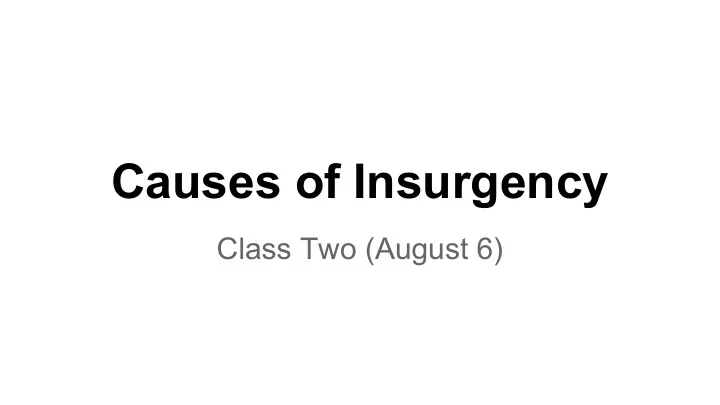

Causes of Insurgency Class Two (August 6)
Review: Definition of insurgency ● Armed uprising against government. ○ Can lead to civil war ○ Varies in scope and effectiveness ○ Insurgents are anti-government fighters ○ Civil wars are conflicts between governments and internal challengers ● Today: Evaluate explanations of why insurgencies begin.
Insurgency present throughout history. ● Asymmetric military tactics used by weaker forces to defeat stronger, usually occupying forces. ● Ex: American Revolution, Anti- Colonial conflicts
Civil wars have become longer and deadlier recently
Adverse consequences ● Economic losses. ● Refugee flows. ● Famine ● Regional and global effect of all three
There are many insurgencies around the world today
Why do people organize to fight the government? ● There are three major explanations: ○ Grievances ○ Greed ○ Opportunity ● Each is flawed and each has merit. ● We look at two cases after the break: ○ South Sudan and Syria.
Grievances ● Advanced by Gurr (1970) and Horowitz (1985). ● Failure to fulfill expected needs leads to aggression. ● Stem from: ○ Relative deprivation. ○ Horizontal inequality.
Relative Deprivation ● Perception of being worse off than others in society. ○ Can be political or economic. ● Conflict arises when group is deprived
Horizontal Inequality ● Relative deprivation Group A: wealthier, language along multiple dominant, politically dominant dimensions. ● If unequal only on Group B: poorer, no some dimensions, language rights, no could affect change representation. from within.
Modernization ● Huntington, Moore, Skocpol. ● Economic shifts leave winners and losers along class lines. ● Conflict formed between middle class and aristocracy, working class and peasants, etc.
What are some issues with the grievance explanation?
Greed ● Rebels are motivated by profit (Grossman 1990, 1995) ● Grievances are used opportunistically to shore up popular support.
Collier and Hoeffler (2004) test greed vs. grievance ● Theory? Is there one? ● Dependent variable? ● Operationalization? ○ Greed? ○ Grievances? ● Do the variables they use actually measure greed or grievance?
Results support greed hypothesis ● Primary commodity exports lead to more conflict (sorta…) ○ As does lower GDP per capita, lower male secondary schooling and short term economic growth. ● What are some problems with these findings?
Opportunity (Fearon and Laitin 2003) ● Neither grievances nor ethnic diversity lead to civil war. ● Argue conditions that make insurgency more likely...make insurgency more likely.
Opportunity (Fearon and Laitin 2003) ● Neither grievances nor ethnic diversity lead to civil war. ● Argue conditions that make insurgency more likely...make insurgency more likely.
Test vs. competing explanations Measures: Ethnic Diversity? Grievances? Insurgency? Do the measures actually measure opportunity? What are their results?
Is opportunity a valuable contribution to understanding conflict? Does it disprove the grievance argument?
Return of Grievances ● More recent work shows support for grievance argument. ● Politically excluded groups, economically unequal groups are more likely to rebel. ● The “Why?” is still not clear.
What explanation makes most sense to you? Why? Break up into groups, talk it over!
Cases Part II
South Sudan: Background
History of United Sudan
History of United Sudan ● Civil war between the North and South from independence. ○ Arab North dominated Christian and Animist South. ○ South revolted over distribution of oil revenues. ● Second Civil War Starts in 1983 ○ SPLA led by John Garang, Salva Kiir and Riek Machar.
SPLA split and war within war
SPLA split and war within war ● SPLA splits in dispute over control of the movement between Dinka Garang and Kiir and Nuer Machar. ● Sparks war between rebel groups in 1990s. ● Creates devastating famine in South Sudan. ○ Hundreds of thousands die.
What happened in the 2000s? ● Machar and Garang settle differences ● Peace accord signed in 2005. ● Garang dies, replaced by Kiir. ● Referendum for independence passes in 2011. ● South Sudan gains independence and control of 70% of Sudan’s oil fields.
What happened in 2013? ● Oil money disappears. ● Kiir removes Machar and Nuer opponents from cabinet. ● Machar accused of plotting coup and forced to flee Juba in December.
How does the war start? ● SPLA splits between Dinka and Nuer. Latter join Machar. ○ Nuer White Army mobilizes. ● Machar attacks oil producing regions. ● Cease-fires are made and broken.
Discussion: Which explanation do you think best explains the outbreak of the South Sudanese Civil War? Is there room for each of the three explanations?
Syria: Background
Colonial History ● French empower minorities. ● Make Lebanon separate country.
Post-Colonial History ● Instability. Coups. Failed Union with Egypt. ● Hafez al-Assad, an Alawite Ba’athist takes power in 1970. ● Uprising by Muslim Brotherhood in 1970s.
Bashar Al-Assad’s Rule ● President after Hafez al-Assad’s death in 2000. ● Briefly perceived as political reformer. ● Introduces capitalist reforms.
Arab Spring and Civil War ● Like most of the Arab World, protest break out in Syria in March 2011. ● Violently repressed by the government. ● Army defections, Free Syrian Army forms.
Sectarian Conflict ● While initially secular, rebellion draws recruits from Sunni Arab and Turkmen communities. ● Alawites, Christians and Druze stay loyal to the government. ● Sunni Kurds form quasi-state in the north.
Which explanation do you think best explains the outbreak of the Syrian Civil War? Is there room for each of the three explanations?
Re-evaluation: which of the three explanations explains insurgency best? Are there other explanations that could fill in some gaps?
Recommend
More recommend